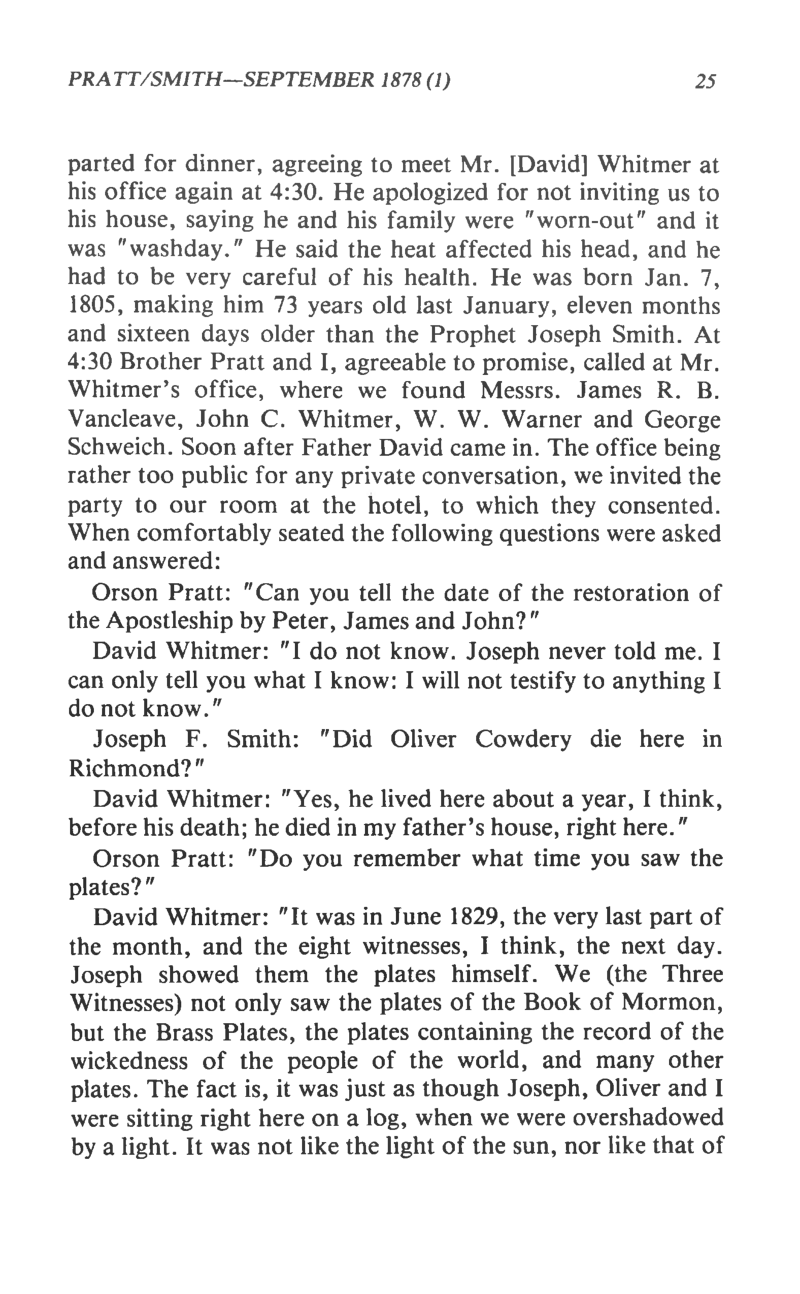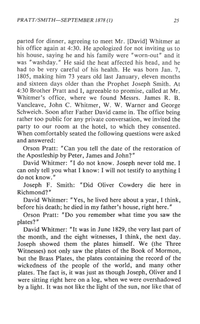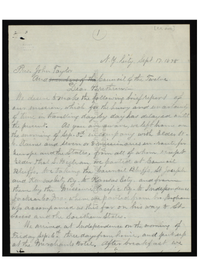Orson Pratt and Joseph F. Smith interview David Whitmer about his experience as a Book of Mormon witness.
- Type
- Interview
- Hearsay
- Scribed VerbatimReprintLate
- Reference
Orson Pratt and Joseph F. Smith, Interview with David Whitmer, September 7, 1878, in Lyndon W. Cook, ed., David Whitmer Interviews: A Restoration Witness (Orem, UT: Grandin Book, 1991), 25–29
- Scribe/Publisher
- Lyndon W. Cook
- People
- Martin Harris, Orson Pratt, David Whitmer, Joseph Smith, Jr., Philander Page, Oliver Cowdery, Joseph F. Smith, John Whitmer
- Audience
- N/A
- Transcription
Orson Pratt: "Can you tell the date of the restoration of the Apostleship by Peter, James and John?"
David Whitmer: "I do not know. Joseph never told me. I can only tell you what I know: I will not testify to anything I do not know."
Joseph F. Smith: "Did Oliver Cowdery die here in Richmond?"
David Whitmer: "Yes, he lived here about a year, I think, before his death; he died in my father’s house, right here."
Orson Pratt: "Do you remember what time you saw the plates?"
David Whitmer: "It was in June 1829, the very last part of the month, and the eight witnesses, I think, the next day. Joseph showed them the plates himself. We (the Three Witnesses) not only saw the plates of the Book of Mormon, but the Brass Plates, the plates containing the record of the wickedness of the people of the world, and many other plates. The fact is, it was just as though Joseph, Oliver and I were sitting right here on a log, when we were overshadowed by a light. It was not like the light of the sun, nor like that of a fire, but more glorious and beautiful. It extended away round us, I cannot tell how far, but in the midst of this light, immediately before us, about as far off as he sits (pointing to John C. Whitmer who was sitting 2 or 3 feet from him) there appeared, as it were, a table, with many records on it, besides the plates of the Book of Mormon; also the sword of Laban, the Directors (i. e. the ball which Lehi had) and the Interpreters. I saw them just as plain as I see this bed (striking his hand upon the bed beside him), and I heard the voice of the Lord as distinctly as I ever heard anything in my life declaring that they (the plates) were translated by the gift and power of God."
Orson Pratt: "Did you see the Angel at this time?"
David Whitmer: "Yes, he stood before us. Martin Harris was not with us at this time. I don’t think he saw all that we did, but our testimony as recorded in the Book of Mormon is strictly and absolutely true just as it is there written. Before I knew anything about Joseph Smith I had heard about him and the plates from persons who declared they knew he had them and swore they would get them from him, and that he had promised them an interest in them when he should get them. The fact is he could not, for they were not to be made merchandise of, nor to be a matter of profit to any one—they were strictly for sacred purposes, and when Oliver Cowdery went to Pennsylvania he promised to write me what he should learn about the matter, which he did. He told me Joseph had told him his secret thoughts and all he had meditated about going to see him, which no man on earth knew, as he supposed, but himself. So he stopped to write for Joseph. Soon after this Joseph sent for me to come to Harmony, to get him and Oliver and bring them to my father’s house. I did not know what to do. I was pressed with my work. I had some 20 acres to plow and so I concluded I would finish plowing, and then go. One morning I got up as usual to go to work. On going to the field I found between 5 and 7 acres of my ground had been plowed during the night. I don’t know who did it, but it was done, just as I would have done it myself, and the plow was left standing in the furrow. This enabled me to start sooner. When I arrived at Harmony, Joseph and Oliver were coming toward me, and met me some little distance from the house. Oliver told me that Joseph had told him when I started from home, where I had stopped the first night, how I read the sign at the tavern, where I stopped the next night and that I would be there that day before dinner, and this was why they had come out to meet me, all of which was exactly as Joseph had told Oliver, at which I was greatly astonished. When I was returning to Fayette with Joseph and Oliver, all of us riding in the wagon, Oliver and I on an old fashioned wooden spring seat and Joseph behind us, we were suddenly approached by a very pleasant, nice looking old man in a clear open place, who saluted us with ‘Good morning, it is very warm,’ at the same instant wiping his face or forehead with his hand. We returned the salutation and by a sign from Joseph I invited him to ride if he was going our way, but he said very pleasantly, ‘No, I am going to Cumorah.’ This was something new to me, I did not know what Cumorah meant, and as I looked enquiringly at Joseph, the old man instantly disappeared so that I did not see him again."
Joseph F. Smith: "Did you notice his appearance?"
David Whitmer: "I should think I did. He was, I should think, about 5 feet 9 or 10 inches and heavy set, about such a man as James Vancleave, there, but heavier. His face was as large. He was dressed in a suit of brown, woolen clothes; his hair and beard were white, about like Brother Pratt’s, but his beard was not so heavy. I also remember that he had a sort of knapsack on his back, and something was in it which was shaped like a book. It was the messenger who had the plates.
"Soon after our arrival home, I saw something which led me to the belief that the plates were placed or concealed in my father’s barn. I frankly asked Joseph if my supposition was right, and he told me it was.
"Sometime after this my mother was going to milk the cows when she was met out near the barn by this same old man, (as I suppose from her description of him) who said to her ‘you have been very faithful and diligent in your labours but you are tried because of the increase of your toil, it is proper therefore that you should receive a witness, that your faith may be strengthened’ and thereupon he showed her the plates. My Father and Mother had a large family of their own. The addition to it therefore of Joseph, Emma and Oliver very greatly increased the toil and anxiety of my mother and altho she had never complained she had sometimes felt that her labor was too much or at least she was beginning to feel so. This circumstance however completely removed all such feelings and nerved her up for her increased responsibilities."
Orson Pratt: "Have you any idea when the records will be brought forth?"
David Whitmer: "When we see things in the Spirit and by the power of God they seem to be right here present. The signs of the times indicate the near approach of the coming forth of the other plates, but when it will be, I cannot tell. The Three Nephites are at work among the lost tribes and elsewhere. John the Revelator is at work, and I believe the time will come suddenly, before we are prepared for it."
Orson Pratt: "Have you got the original manuscript of the Book of Mormon?"
David Whitmer: "I have. It is in Oliver Cowdery’s handwriting. He placed it in my care at his death, and charged me to preserve it as long as I lived. It is safe, and well preserved."
Joseph F. Smith: "What will you do with it at your death?"
David Whitmer: "I will leave it with my nephew, David Whitmer, son of my brother Jacob and my namesake."
Orson Pratt: "Would you not part with it?"
David Whitmer: "No. Oliver charged me to keep it and Joseph said my father’s house should keep the records. I consider these things sacred and would not barter them for money."
Joseph F. Smith: "We would not offer you money in the light of bartering for the manuscript, but we would like to see them preserved in some manner where they would be safe from casualties and from the caprice of men, in some institution that will not die as a man does."
David Whitmer: "This is all right. While camping around here in a tent and all my effects exposed to the weather, everything in the trunk where the manuscript was kept became mouldy, but that was preserved, not even being discolored."
His camping in a tent had reference to their circumstances after the destruction of their property by the cyclone. His bam and dwelling having been destroyed, save and except only the room in his house in which the record, or manuscript, was kept. This was spared, not even the ceiling being seriously impaired. This event by the whole family and connections is accepted as a miraculous interposition of Divine Providence, for the preservation of the sacred treasure.
"Do you think," said Phil Page, a son of Hiram Page, one of the Eight Witnesses, "that the Almighty cannot take care of his own?"
- Citations in Mormonr Qnas
The B. H. Roberts Foundation is not owned by, operated by, or affiliated with the Church of Jesus Christ of Latter-day Saints.



